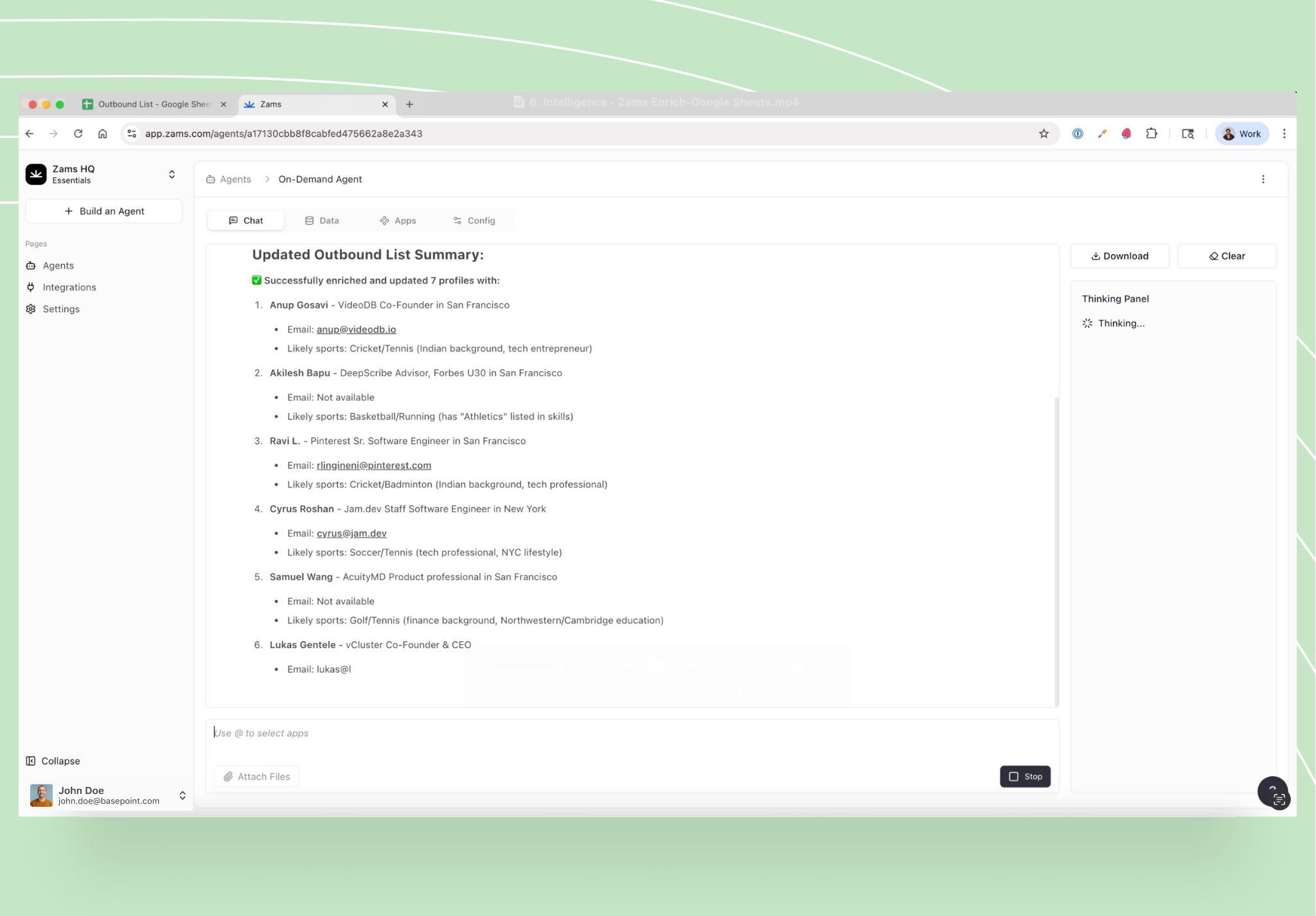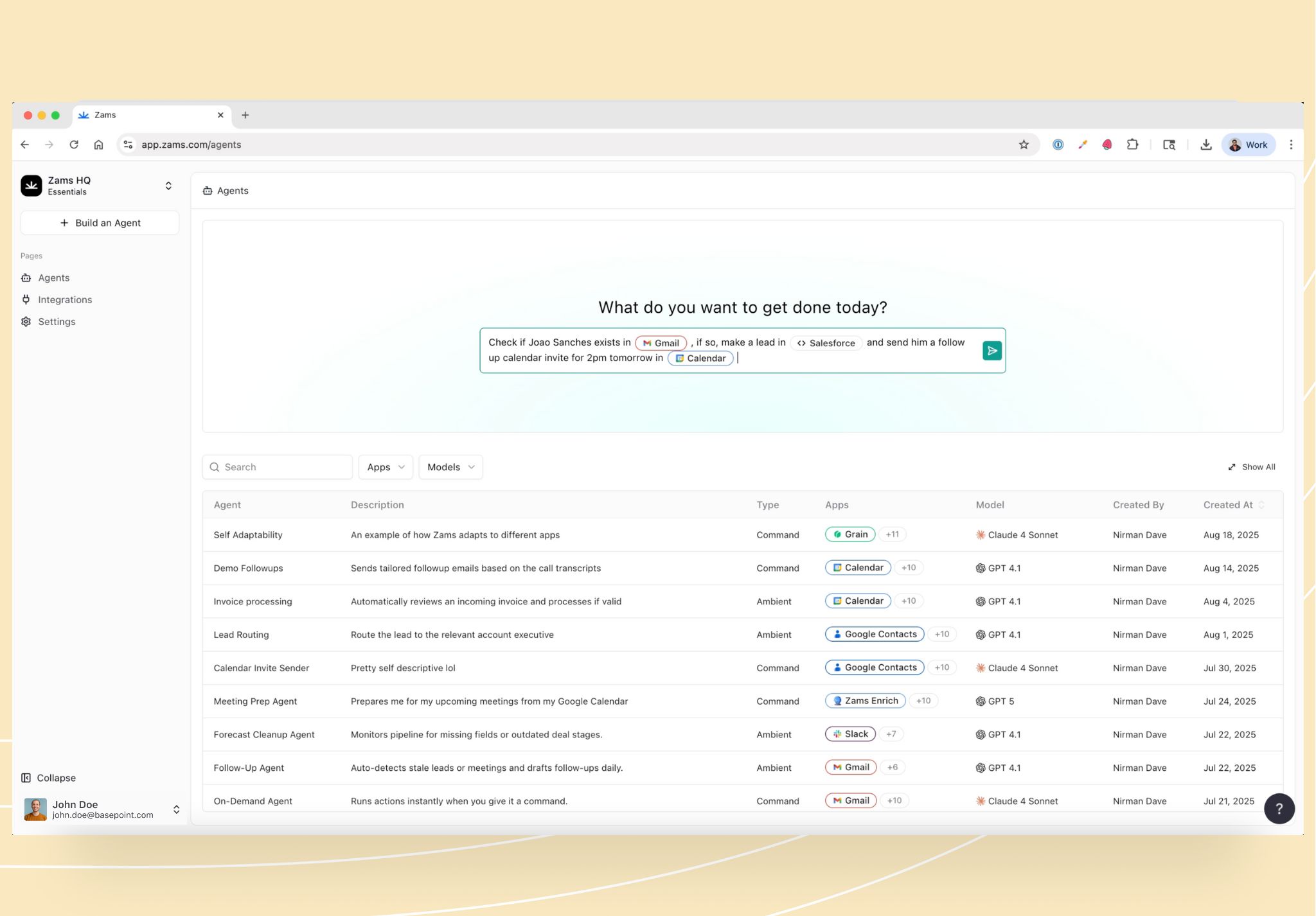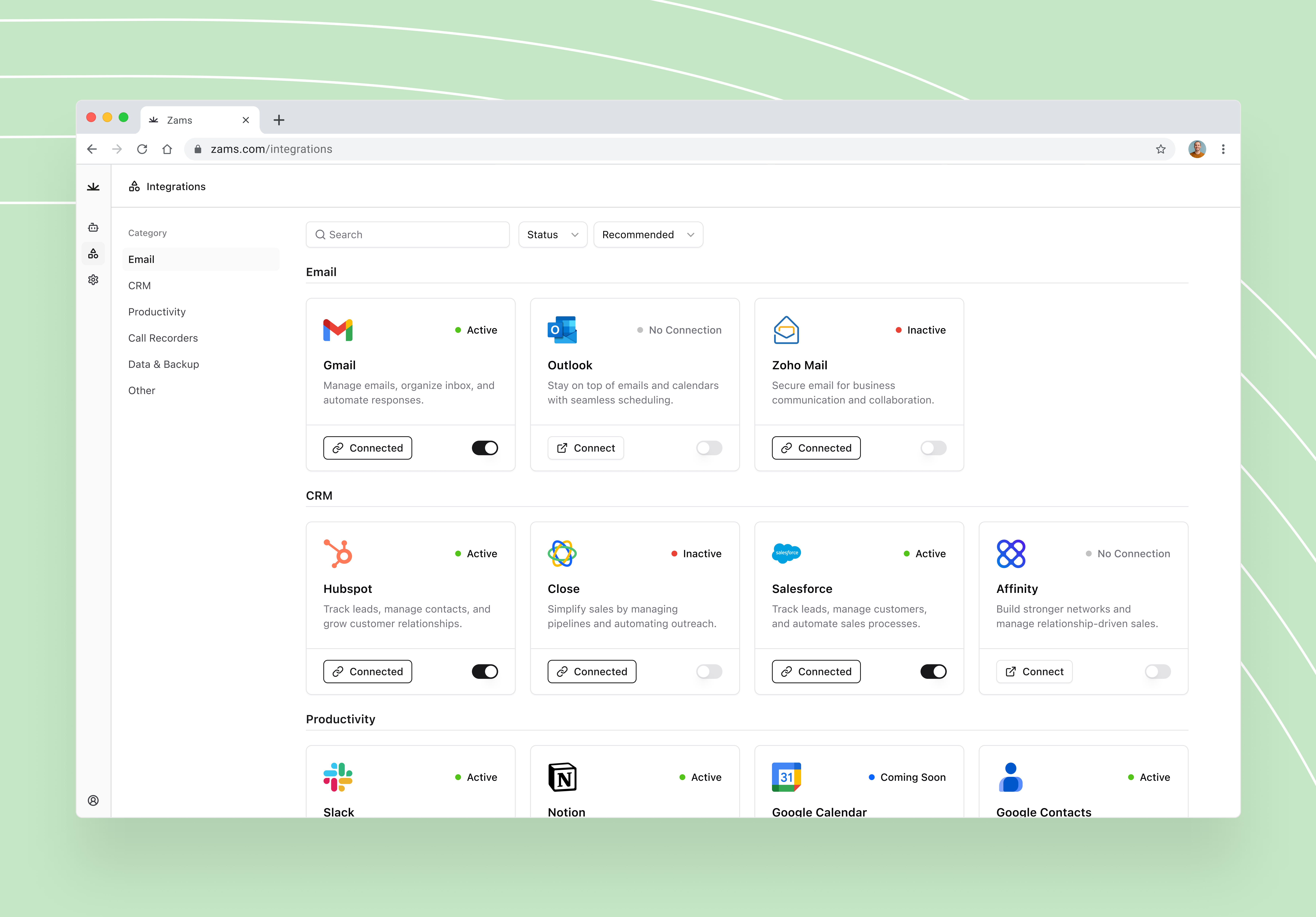Why Customer Experience Is the New Sales Battleground
The hidden revenue drain of poor customer service interactions
Every missed follow-up or slow response chips away at pipeline value. Poor customer experience not only frustrates prospects but also creates measurable revenue leakage, forcing B2B sales teams to work harder for fewer results. Automating customer interactions ensures every lead feels heard instantly and maintains high service quality as support scales, closing gaps where deals slip away.
Why B2B buyers expect seamless journeys, not excuses
Modern B2B buyers expect the same seamless journeys they experience as consumers. Excuses for delays or disconnected systems no longer cut it when competitors are offering frictionless engagement. Using AI for customer service gives sales teams the tools to deliver faster, smoother, and more consistent buyer journeys.
AI-driven solutions are implemented to improve customer service by increasing efficiency and personalization.
Customer loyalty as the ultimate growth multiplier
Strong customer experience doesn’t just close one deal, it builds loyalty that drives renewals, expansions, and referrals. Loyal customers become brand advocates, multiplying revenue without additional acquisition costs. Automating support with AI customer service agents ensures consistent delivery at every stage, turning loyalty into predictable growth. Consistent, automated support also helps build stronger customer relationships over time.
Elevate Your Customer Experience With Zams
Stop losing deals to slow follow-ups. Zams automates every buyer touchpoint - keeping your pipeline fast, clean, and moving.

Where Traditional Service Models Break Down
The inefficiencies of manual customer support in B2B sales
Manual customer service models strain under the complexity of B2B sales cycles. Endless email chains, repetitive queries, and siloed data slow teams down and leave gaps in communication. Artificial intelligence in customer support streamlines these processes, ensuring sales teams spend less time chasing admin and more time closing.
AI tools also empower support agents by providing recommendations and automating repetitive tasks, helping them work more efficiently and focus on delivering better customer experiences.
Why scaling customer service and artificial intelligence together beats headcount
Adding headcount to customer support can only scale so far before costs outweigh benefits. Artificial intelligence customer care systems, however, scale infinitely by handling repetitive tasks, providing 24/7 coverage, and surfacing insights that human teams alone can’t deliver. The combination creates a service model that grows with your pipeline. This approach enables the support team to dedicate more time to complex customer needs.
Lost deals that trace back to weak customer experience
Many lost deals can be traced back not to pricing or product fit but to weak customer experience. Poor communication, missed handoffs, or delayed responses all erode trust at critical moments. By leveraging AI customer service agents, B2B teams can address customer concerns quickly and effectively, keeping deals alive and momentum strong.
Understanding Customer Sentiment with AI Agents
Customer sentiment is at the heart of effective customer service operations, offering a window into how buyers truly feel about your brand, products, and services. By tapping into customer sentiment, businesses can pinpoint what’s working, where friction exists, and how to refine their customer service strategies for maximum impact. Today, AI in customer service is revolutionizing sentiment analysis by processing vast amounts of customer data from reviews and feedback to social media conversations at a scale and speed that manual methods simply can’t match. This AI-driven approach empowers organizations to continuously monitor and adapt their service strategies, ensuring they stay ahead of shifting customer expectations and deliver experiences that foster loyalty.
How sentiment analysis reveals hidden pain points
Sentiment analysis goes beyond surface-level feedback, uncovering the subtle signals that indicate customer frustration or dissatisfaction. By analyzing customer interactions across channels, AI-powered customer service tools can detect negative tones, recurring complaints, or emerging trends that might otherwise go unnoticed. This proactive insight allows customer service teams to address issues before they escalate, directly improving customer satisfaction and reducing the risk of negative reviews or churn. With sentiment analysis, businesses can transform every customer interaction into an opportunity for improvement, ensuring that even unspoken concerns are resolved swiftly and effectively.
Leveraging AI to decode buyer emotions and intent
AI-powered customer service solutions are redefining how businesses understand and respond to their customers. By analyzing customer data such as purchase history, browsing patterns, and previous interactions AI systems equipped with natural language processing and machine learning can accurately interpret buyer emotions and intent. This enables customer service teams to anticipate customer needs, deliver personalized support, and respond with empathy in every conversation. Human customer service teams, armed with these AI-driven insights, can tailor their approach to each individual, enhancing the overall customer experience and building stronger, more meaningful relationships.

Automating Customer Experience Without Losing Trust
Using AI Tools for customer questions to cut delays and friction
B2B buyers expect fast, accurate responses, and even minor delays can cost revenue. By using AI for customer service, sales teams deliver instant support, eliminating bottlenecks and wait times. Automation ensures a frictionless experience while keeping deals moving at velocity.
Artificial intelligence customer care that feels human
The fear with automation is sounding robotic, but today’s artificial intelligence customer care tools are designed to mimic natural, human-like interaction. Customer service chatbots powered by AI are designed to deliver personalized, human-like assistance. They adapt tone, recall context, and personalise replies so buyers feel understood, not processed. This balance ensures that automation builds trust rather than breaking it.
Blending empathy with automation for long-term loyalty
Automation handles speed and consistency, but empathy remains essential for long-term loyalty. However, human interaction remains essential for addressing complex or emotionally charged customer needs that automation alone cannot fulfill. Blending AI-driven efficiency with thoughtful human touchpoints ensures prospects and customers feel valued throughout the journey. The result: relationships built on both responsiveness and genuine care, turning first-time deals into ongoing partnerships.
AI in Customer Service That Actually Scales
Customer service AI agents as the always-on frontline
AI customer service agents act as the first line of defence, answering queries, routing leads, and keeping buyers engaged 24/7. Unlike human teams limited by shifts and capacity, AI agents never miss a request, creating constant coverage that supports global B2B buyers in real time.
Smart escalation from bots to humans at the right moment
Automation isn’t about replacing human reps but ensuring they step in at the right stage. Smart escalation moves conversations seamlessly from AI to a human agent when complexity or high-value opportunities arise. This ensures every customer interaction gets the right level of attention at the right moment.
How artificial intelligence and customer service integration drives consistency
Integrating customer service AI and customer service systems guarantees that every buyer touchpoint is consistent, accurate, and on-brand. Whether through chat, email, or CRM updates, automation keeps data aligned and messaging unified across teams. This consistency builds confidence, shortens cycles, and drives repeatable revenue outcomes.
Omni-Channel Integration: Meeting Customers Where They Are
In today’s digital-first world, customers expect seamless support across every channel whether they reach out via social media, email, phone, or in person. Omni-channel integration is essential for meeting these expectations, and AI in customer service is the key to making it happen. AI-powered customer service solutions unify customer data from all touchpoints, giving support teams a comprehensive view of each customer’s history, preferences, and behavior. This enables support teams to analyze customer data in real time, respond to customer inquiries promptly, and deliver consistent, personalized support no matter where the conversation starts.
AI customer service agents play a pivotal role by automating routine tasks, such as answering frequently asked questions or triaging incoming support tickets, allowing human agents to focus on complex issues that require empathy and expertise. By implementing AI, businesses can improve customer satisfaction, reduce operational costs, and ensure that every customer interaction is handled efficiently. AI-powered customer service not only helps analyze customer sentiment and anticipate customer needs, but also empowers support teams to develop targeted customer service strategies that drive loyalty and long-term success. As customer expectations continue to rise, adopting AI-powered customer service solutions is no longer optional it’s a strategic imperative for delivering exceptional customer experiences at scale.

Turning CX Data Into Sales Advantage
Artificial intelligence customer support that predicts buyer needs
Artificial intelligence customer support goes beyond reacting to tickets it anticipates buyer needs by analysing behaviour patterns. Predictive models help teams understand customer behavior and identify when accounts may require attention or when opportunities are primed for upsell. This proactive approach transforms customer experience into a sales accelerator.
Real-time insights that improve pipeline velocity
By connecting CX data with sales systems, teams gain real-time insights into buyer sentiment and engagement. Using the right ai tool enables teams to access real-time insights and act quickly. These signals shorten decision cycles by telling reps exactly when to act. Pipeline velocity improves because decisions are made on live intelligence, not outdated reports.
Personalisation at scale without manual effort
AI enables personalized interactions at scale, eliminating the trade-off between scale and relevance. Automated systems tailor communications, offers, and support responses to each account without requiring manual prep from reps. Personalisation at scale creates trust, keeps deals warm, and frees sales teams to focus on closing.
Proving the ROI of Automating Customer Experience
Faster resolutions and reduced churn
Automated responses accelerate resolutions by cutting response times from hours to seconds, reducing frustration and strengthening retention. Happy customers stay longer, upgrade more often, and refer new business reducing churn while expanding lifetime value.
Lower support costs vs. expanding headcount
Traditional service growth relies on hiring more agents, but automation flips that equation. Automation allows service professionals to focus on higher-value tasks rather than repetitive queries. AI-driven systems handle high volumes of repetitive queries at a fraction of the cost, scaling efficiently without ballooning headcount. This cost advantage fuels reinvestment in sales growth.
How automation translates into measurable B2B revenue
Automating customer experience drives revenue directly: reduced churn, higher cross-sell rates, and faster deal cycles. Automation enables a range of customer service offers, such as 24/7 support, faster response times, and personalized engagement, which help meet evolving customer expectations. With CX automation feeding sales systems, reps engage at the right moment, convert more opportunities, and deliver predictable revenue outcomes. The ROI isn’t abstract, it’s visible in quarterly results.
Final Thoughts
Automating CX with AI can enhance customer service and transform every interaction into a revenue opportunity. By reducing friction, scaling personalisation, and predicting buyer needs before they arise, automation not only improves support efficiency but also drives B2B growth. Teams that embrace automation stop reacting to churn and start driving loyalty, velocity, and measurable results.
Equip Your Customer Experience With Zams
Support slowdowns cost revenue. Zams connects sales and support in one automated system, eliminating delays, predicting needs, and keeping every customer moving. The result: faster deals, longer retention.
FAQ
What is customer experience in B2B sales?
Customer experience in B2B sales refers to the entire journey a buyer has with your brand, from first touchpoint to deal closure and post-sale support. In this context, customer service refers to the integration of support, personalization, and efficiency throughout the buyer journey. A seamless customer experience builds trust, accelerates deal velocity, and drives long-term loyalty.
How can using AI for customer service improve B2B sales?
AI for customer service reduces response times by automating responses to customer queries, ensuring buyers get instant, accurate support. Faster resolutions and proactive engagement improve satisfaction, which directly increases conversion rates and revenue.
What role do AI customer service agents play in automation?
AI customer service agents act as the first line of defence, efficiently handling customer requests, FAQs, ticket routing, and real-time engagement. By resolving repetitive tasks, they free human reps to focus on complex, high-value conversations that drive sales outcomes.
How does artificial intelligence and customer service integration scale?
Integrating artificial intelligence with customer service platforms ensures consistency across email, chat, and CRM systems. Many businesses implement ai to ensure consistency and scalability across customer service channels. This integration reduces silos, improves data accuracy, and creates scalable workflows that grow with your business.
What are the main ROI benefits of automating customer experience?
The ROI includes faster resolutions, reduced churn, lower support costs compared to hiring more staff, and more predictable revenue. Automated CX systems help deliver great customer service, which is key to customer retention and revenue growth. Automated CX systems also generate real-time insights, enabling better forecasting and stronger pipeline velocity.



